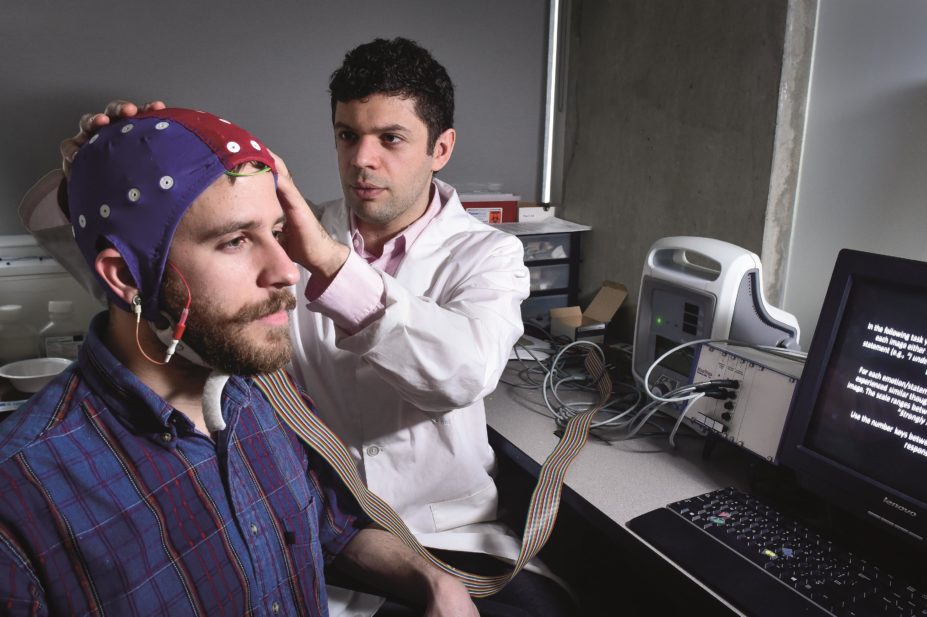
Ken Jones / University of Toronto
Over-the-counter painkiller paracetamol (known as acetaminophen in the United States) may be making it more difficult for the brain to detect errors, according to research.
A team of scientists, led by Daniel Randles, postdoctoral fellow at the University of Toronto, conducted what they say is the first neurological study to examine the extent to which paracetamol inhibits the brain response associated with making errors.
The researchers, who report their findings in the June issue of Social Cognitive and Affective Neuroscience
[1]
(2016;11(6):899–906), divided 62 patients into two groups, one of which was given 1,000mg of paracetamol, the equivalent of a normal maximum dose, while the other group was given placebo. Participants were then asked to undertake a task called ‘go’ or ‘no go,’ which required them to hit a button every time they saw the letter F flash on a screen, but to refrain from hitting the button if they saw the letter E.
Each participant was connected to an electroencephalogram (EEG), which measures electrical activity in the brain. The researchers then looked for particular waves, known as error related negativity (ERN) or error related positivity (Pe).
While the researchers would normally expect a strong increase in ERN and Pe when errors are made, the paracetamol group showed a smaller Pe when making mistakes than those in the placebo group, suggesting that paracetamol inhibited conscious awareness of the mistake.
If paracetamol undermines the ability to recognise mistakes, this could suggest an impact on cognitive control on daily life, Randles says.
In addition to being less aware of errors, the researchers also discovered that the paracetamol group showed a greater tendency to make mistakes, missing more of the ‘go’ stimuli than expected. Randles says he plans to expand the research to see if paracetamol causes subjects to become more distracted.
The study authors conclude that although automatic cognitive tasks such as reading, walking or talking are considered to be well mapped-out neurological processes that often require very little cognitive control, impairment of this control can have an impact on neurological function.
“Whether operating complex machinery, coordinating teams of individuals, or driving a car, cognitive control is important for quickly and accurately responding to everyday challenges,” the team says. “Additional studies monitoring different types of tasks, and under more ecologically valid conditions, will help to verify the magnitude of the real-world effect of this medication.”
Recent behavioural research has suggested paracetamol might also inhibit people’s responses more generally. Randles’ previous research, published in Psychological Science
[2]
in June 2013, found that people are less reactive to uncertain situations when they have taken the drug.
In 2015, another team of researchers from Ohio State University found that paracetamol blunts both positive and negative emotions, according to an article published in Psychological Science
[3]
.
Geoff Durso, a PhD candidate in social psychology who was the lead author of the Ohio State University study, says Randles’ latest research helps to widen understanding about the impact of paracetamol on the brain.
“The new work… provides some suggestive evidence that one possible explanation for pain/emotion blunting by paracetamol may be due in part to its attenuation of individuals’ attention to important figures of one’s environment,” he says.
“It is fascinating work and helps us to clarify more specifically how paracetamol is affecting critical brain processes and psychological responses to our social environments.”
References
[1] Randles D, Kam JWY, Heine SJ et al. Acetaminophen attenuates error evaluation in cortex. Soc Cogn Affect Neurosci. 2016;11(6):899–906. doi: 10.1093/scan/nsw023
[2] Randles D, Heine SJ & Santos N. The common pain of surrealism and death: acetaminophen reduces compensatory affirmation following meaning threats. Psychological Science 2013;24:966–973. doi: 10.1177/0956797612464786
[3] Durso GRO, Luttrell A & Way BM. Over-the-counter relief from pains and pleasures alike: acetaminophen blunts evaluation sensitivity to both negative and positive stimuli. Psychological Science. 2015;26:750–758. doi: 10.1177/0956797615570366


